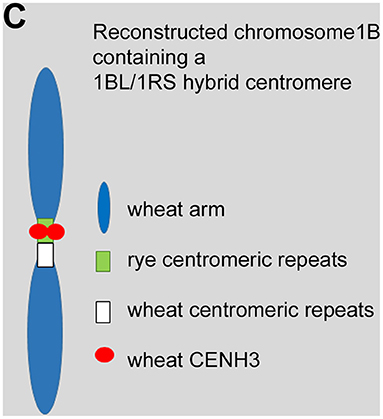- 1Department of Biotechnology, Faculty of Agriculture, Tarbiat Modares University, Tehran, Iran
- 2Leibniz Institute of Plant Genetics and Crop Plant Research (IPK), Gatersleben, Germany
A Corrigendum on
Only the Rye Derived Part of the 1BL/1RS Hybrid Centromere Incorporates CENH3 of Wheat
by Karimi-Ashtiyani, R., Schubert, V., and Houben, A. (2021). Front. Plant Sci. 12:802222. doi: 10.3389/fpls.2021.802222
In the original article, there was an error. The origin and history of the analysed 1B/1R hybrid centromere was not correctly described and required correction in the Abstract, Materials and Methods section, and Figure 1C.
A correction has been made to the Abstract.
The original text, “The wheat-rye 1BL/1RS translocation chromosome in the background of wheat resulted from a centric misdivision followed by the fusion of the broken arms of chromosomes 1B and 1R from wheat and rye, respectively” has been corrected to: “A chromosome 1B reconstructed in wheat by centric misdivision from two wheat-rye centric translocations is known to carry a hybrid wheat-rye centromere.”
A correction has been made to the section Materials and Methods, subsection Plant Material and Cultivation, paragraph 1:
“The 1Brec-1 line of cv. Pavon 76 carrying a reconstructed chromosome 1B (Lukaszewski, 1993, 1997) was grown in a greenhouse at 16 h light, 22°C day/16°C night conditions. Chromosome 1Brec-1 was reconstructed by centric misdivision from two centric wheat-rye translocations, 1RS.1BL and 1BS.1RL. In essence, the chromosome itself is a centric translocation, composed of a wheat chromosome arm 1BS from cv. Pavon 76 and 1BL arm from the translocation 1RS.1BL from the Aurora/Kavkaz source (Lukaszewski, 1993, 1997). As demonstrated by Zhang et al. (2001) this chromosome carries a hybrid centromere, composed in part of a wheat centromere and in part of a rye centromere.”
In the original article, there was a mistake in Figure 1C as published because the origin of the chromosome arms was wrongly depicted. Additionally, the origin of the analysed chromosome was wrongly described in the legend for Figure 1C. The corrected Figure 1C and its legend appears below.

Figure 1. (C) Schematic representation of the reconstructed wheat chromosome 1B with a hybrid wheat-rye centromere. This centromere is composed of wheat and rye centromeric repeats. The wheat-derived CENH3 co-localized only with the rye-derived centromeric chromatin creating a functional chromosome.
The authors apologize for these errors and state that this does not change the scientific conclusions of the article in any way. The original article has been updated.
Publisher's Note
All claims expressed in this article are solely those of the authors and do not necessarily represent those of their affiliated organizations, or those of the publisher, the editors and the reviewers. Any product that may be evaluated in this article, or claim that may be made by its manufacturer, is not guaranteed or endorsed by the publisher.
References
Lukaszewski, A. J. (1993). Reconstruction in wheat of complete chromosomes 1B and 1R from the 1RS.1BL translocation of 'Kavkaz' origin. Genome 36, 821–824. doi: 10.1139/g93-109
Lukaszewski, A. J. (1997). Further manipulation by centric misdivision of the 1RS.1BL translocation in wheat. Euphytica 94, 257–261. doi: 10.1023/A:1002916323085
Zhang, P., Friebe, B., Lukaszewski, A. J., and Gill, B. S. (2001). The centromere structure in Robertsonian wheat-rye translocation chromosomes indicates that centric breakage-fusion can occur at different positions within the primary constriction. Chromosoma 110, 335–344. doi: 10.1007/s004120100159
Keywords: CENH3, 1BL/1RS, Robertsonian translocation, wheat, dicentric, rye, hybrid centromere
Citation: Karimi-Ashtiyani R, Schubert V and Houben A (2022) Corrigendum: Only the Rye Derived Part of the 1BL/1RS Hybrid Centromere Incorporates CENH3 of Wheat. Front. Plant Sci. 13:854911. doi: 10.3389/fpls.2022.854911
Received: 14 January 2022; Accepted: 02 February 2022;
Published: 04 March 2022.
Copyright © 2022 Karimi-Ashtiyani, Schubert and Houben. This is an open-access article distributed under the terms of the Creative Commons Attribution License (CC BY). The use, distribution or reproduction in other forums is permitted, provided the original author(s) and the copyright owner(s) are credited and that the original publication in this journal is cited, in accordance with accepted academic practice. No use, distribution or reproduction is permitted which does not comply with these terms.
*Correspondence: Raheleh Karimi-Ashtiyani, ci5rYXJpbWlAbW9kYXJlcy5hYy5pcg==; Andreas Houben, aG91YmVuQGlway1nYXRlcnNsZWJlbi5kZQ==
 Raheleh Karimi-Ashtiyani
Raheleh Karimi-Ashtiyani Veit Schubert
Veit Schubert Andreas Houben
Andreas Houben